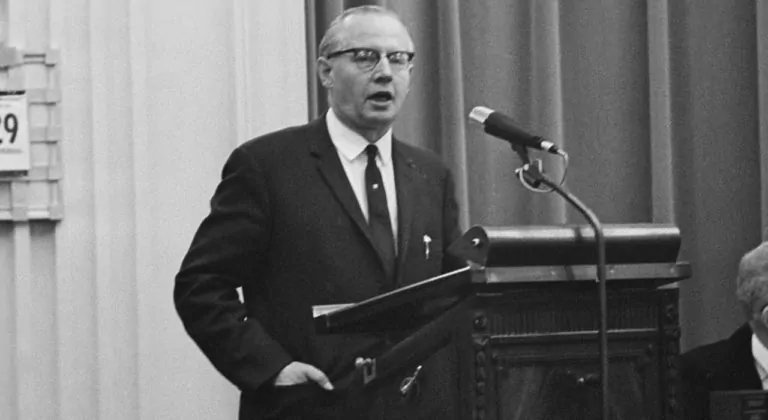When one writes about Reformed journalism one inevitably thinks about the sort of journalism that for so many years published newspapers and weekly papers in the Netherlands. In our English-speaking world there are also magazines of Reformed persuasion that do a good job of informing believers. However, most of these magazines (Reformed Perspective excepted) are by and large magazines with a religious focus – magazines aimed at informing people in the pew about what is happening in other pews around the country.
On the shoulders of giants
Reformed journalism in the Netherlands was different in that it addressed the day to day events going on outside the Church. This type of Reformed journalism has a long history in the Netherlands – we can go back to G. Groen van Prinsterer, the Dutch statesman and Reformed historian (1801-1876) whose aim, in his writings, was to return the Dutch nation to its Reformed roots. While influential, van Prinsterer was often only read by those well off enough to be able to buy a newspaper. Ordinary people back then (such as the members of the Reformed churches) were not able to afford a newspaper – a Dutch tax on newspapers made them hard to afford.
Still, Groen started us down the road of Reformed journalism, and later his successor, Abraham Kuyper, broadened the effort, in large part due to the abolishment of the newspaper tax. And, of course, it helped that while Kuyper’s journalistic efforts had a particular appeal to those of a Reformed persuasion, they were appealing to the nation as a whole too.
Following in the tradition of Groen and Kuyper, there was an important Reformed journalist much closer to our time. I refer to Pieter Jongeling. He was for many years the editor of a Reformed Dutch newspaper, Nederlands Dagblad, member of the Dutch Parliament and author of many children’s books which he published under the pseudonym Piet Prins. Without the example of van Prinsterer, Kuyper and Jongeling (and there are others as well) I would suggest it is highly doubtful that Reformed Perspective would have seen the light of day.
His early years
Jongeling was born in Winschoten, a town in the northern part of the Netherlands close to the German border.1 The year was 1909. Less than 5 years later his father died and his mother was left alone to care for her family. She did this by running a grocer’s shop – I guess today we would say a corner store.
Those were difficult years in which to grow up. Money was scarce, economic conditions far from rosy. Yet despite this, through ardent self-study, Jongeling was able to get a senior teacher’s diploma but with little hope of getting a job. He was active in the young men’s bible study group and also began publishing stories and poems in the Christian papers of those days. As a result he was employed by one of these papers as a foreign editor.
It’s said of Jongeling: ”he was a man who lived with the Bible.” This was quite evident in his work as a journalist.
World War II
All too soon this work came to an end when the German hordes overran the Netherlands and soon the paper was closed down. But that didn’t mean Jongeling stopped writing.
Due to his ongoing journalism efforts in the following year – efforts aimed at informing his readers about the activities of the German occupiers – he was arrested in the Spring of 1942. The Germans did not believe in proper legal procedures at that time, with the result that Jongeling was asked to sign a paper admitting his guilt. The paper claimed that he was: “a fanatical opponent of National Socialism” – i.e. Nazism. This was something Jongeling agreed with wholeheartedly so he signed the paper with pride. Together with many Reformed people, he regarded National Socialism as totally contrary to what the Bible teaches.
The outcome was that he was sent to Sachsenhausen, Oranienburg, 30 kilometers northwest of Berlin, where he spent the next three years. Who can possibly understand the privations suffered by these people, not knowing what was happening at home, and the trauma involved in being held by people who were utterly ruthless? Jongeling relates that he and 40 other men were sent to Sachsenhausen but as far as he was aware only 5 returned after the war. Many were executed without charge or based only on an accusation!
Jongeling’s wife undertook a number of schemes to get messages to her husband. For example, a Christmas card featured the photo of their daughter to give him some idea of what she looked like. All in all, the following years were quite harrowing when considered from my comfortable armchair in Australia.
As the Russians advanced on Germany from the east, Jongeling and his fellow prisoners were marched out of Sachsenhausen. The fanatical, ruthless S.S., the Nazi police force, were put in control of the group that left Sachsenhausen. These Nazi butchers still insisted that their prisoners keep order as they marched on. Many were unable to do that following the brutal privations in the camps and as they collapsed from exhaustion by the side of the road there was no hesitation by the S.S. to put a bullet in the head of a fallen man.
Even after reading what Jongeling and his compatriots suffered, I find it is still hard to imagine. But as he confessed on arriving back in the Netherlands, it was God who saved him and restored him to his wife, family and church.
Back to work
However, changes had taken place during the years Jongeling had spent in Germany. There had been synodical proceedings that resulted in many faithful members of the Reformed churches finding themselves outside the church denomination that they had belonged to since birth. Jongeling and his wife were now members of the new Reformed churches (Liberated).
When he went back to his job as a journalist Jongeling described journalism as follows:
“A journalist must above all be able to tell a story. He must make the matter clear to the people. If he wants to do that well, then he must, according to me, start from the law of God. That must be the norm. Else the danger exists that evil is called good and good evil and then he misses his target.”
He needed two or three months to recuperate, to bring his body back to something like a normal weight. On his return he had weighed 45 kg (99 pounds) and so time to get back to some normality was not out of place. He returned to work on May 20, 1945 and on July 1st that year he resumed work as Editor-in-Chief of the daily paper he had worked for before the war.
Editor extraordinaire
One would think that upon returning to his post he would be able to do his work with joy, and with the full support of his superiors. But that was not to be. The paper, formerly a Reformed publication, had under the direction of its previous temporary Editor-in-Chief been turned into a newspaper with only a general Christian character. In other words, it was now a paper that did not comment on the struggles within the Reformed churches of the Netherlands.
Nevertheless, Jongeling fully understanding where the direction was coming from, approached his work as a Reformed believer. If they wanted him to write from a general Christian basis, well, as he said, “I took [the] general Christian basis as one based on Scripture and the confession. What is contrary to that, I regard as unchristian and revolutionary …”
The next three years were often difficult because of the basic disagreement between the editor and directors about the church question. When in 1948 he realized the end of his editorship was nearing, and he was offered the job of editor of a magazine called De Vrije Kerk (the Free Church), he accepted that offer. As he relates, it meant that he had a task and some income, although considerably less than in his previous position.
The magazine received a name change to Gereformeerd Gezinsblad – Reformed Family paper. It sought to inform and encourage people throughout the Netherlands to follow the Reformed course.
At first, the paper was issued only a couple of times per week. It had very little news but consisted of an editorial, a review of what was happening nationally and internationally, together with opinion and comment rather than news. I remember those days, and do recall it was indeed very small and basic but still the readers were being informed about what it meant to be Reformed in the state and the world around us.
For many years after we migrated to Australia, this paper, which later received a new name Nederlands Dagblad (Dutch Daily Paper), was read in our home even after I married an Australian who spoke not a word of Dutch. It never failed to teach me much about politics from a Reformed perspective. For this work we have to be truly thankful to Piet Jongeling.
Always teaching
He also taught and gave direction to Reformed Christians when he was persuaded to stand for election to the Dutch Parliament, and in 1959 received enough votes for the G.P.V (the Reformed Political Union) to enter parliament as its lone representative.
They were difficult times, editor, parliamentarian, husband, and father to three sons and six daughters. Adding to his load, one of his sons died not long after the child was born.
And yet Jongeling was highly regarded for his principled approach to his various tasks.
He saw it as his task to inform and instruct his fellow believers in the world in which they were placed. I read somewhere the following:
“Jongeling wanted in the first place to contribute to the molding and strengthening of his fellow believers. He was somewhat worried about the future. The Christian Dutch nation had become neutral in the 19th century and seemed to be degenerating into one that was antichristian. There would come a time when there would be no place for truly Christian life in it. On the other hand, he did not doubt that God would fulfill his promises to His people. In his childlike faith he remained in all circumstances certain of God’s faithfulness.“
Well done, good and faithful servant
Here, then, was a man used indeed by God to build and strengthen the faith of many. In addition to all his other work he also wrote many novels for youth, some 60 or more of them, and wrote poetry, and was indeed an all-rounder in the journalistic sphere. And as some old-time Reformed Perspective readers may remember, he even contributed articles to this magazine.
Our brother died in August 1985.
Endnote
1 For most of this information, I am indebted to Rik Valkenburg, a Dutch author, and journalist, who interviewed Jongeling and published the result in the book, Jongeling, Ten voeten ui
A version of this article was first published in the July/August 2004 issue. Rene Vermeulen published more than 150 articles in the pages of Reformed Perspective from 1984-2010.












